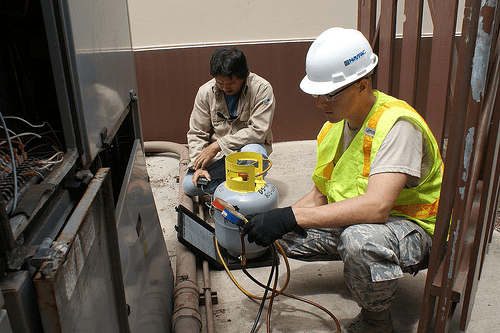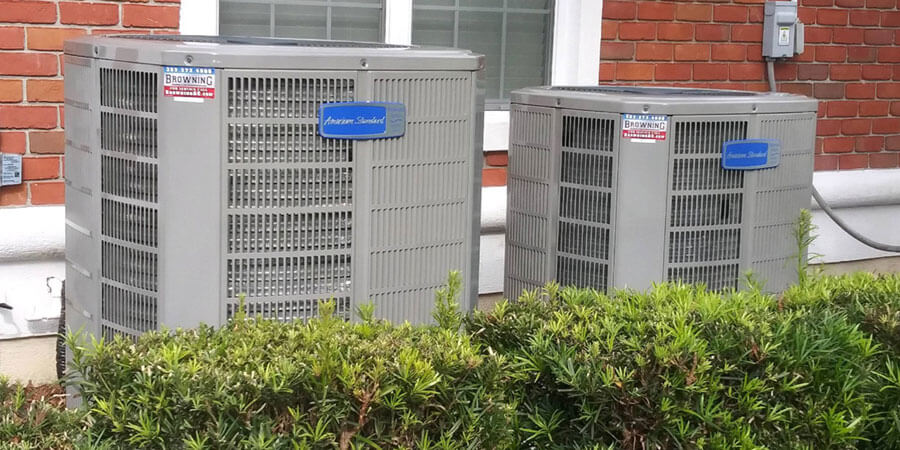Professional Tips for Successful Air Conditioning Installation Brownwood TX
Professional Tips for Successful Air Conditioning Installation Brownwood TX
Blog Article
The Significance of HVAC Setup: Key Considerations for a Comfy Indoor Environment
The setup of a heating and cooling system is a crucial element in attaining a comfortable and energy-efficient indoor environment. The procedure includes several nuanced factors to consider that go past merely selecting an unit off the shelf. Variables such as the suitability of the system for particular building requirements, right sizing to prevent ineffectiveness, and the competence of service providers for a quality installation play essential duties. The adoption of sophisticated modern technologies can considerably enhance system performance. Understanding these intricacies is simply the start of making sure ideal indoor comfort. What are the important aspects that dictate successful HVAC implementation?
Selecting the Right System

When selecting a HVAC system, it is vital to evaluate the capability called for to properly warmth or cool down the area without exhausting the system, which can bring about raised wear and functional prices. Consulting with a specialist a/c service provider can provide valuable insights right into selecting a system that straightens with both the building layout and the awaited use patterns of the structure.
In addition, taking into consideration the assimilation of clever innovation can improve system administration and tracking, providing greater control and potential price financial savings. By diligently examining these aspects, one can guarantee the selection of a heating and cooling system that not only meets prompt requirements but also adds to long-lasting operational sustainability and occupant convenience.
Comprehending Energy Performance
Recognizing energy performance is essential when taking into consideration a heating and cooling installation, as it straight affects both the ecological footprint and the operational prices of the system. High-efficiency a/c units are created to use much less energy to accomplish the same degree of comfort as much less efficient designs, thereby minimizing utility expenses and promoting sustainability. The effectiveness of a HVAC system is normally indicated by scores such as SEER (Seasonal Power Effectiveness Proportion) for air conditioners or AFUE (Annual Gas Utilization Effectiveness) for furnaces. Greater rankings signify better efficiency and lowered power consumption.

Purchasing an energy-efficient cooling and heating system not just equates to cost financial savings yet likewise adds positively to ecological preservation by reducing greenhouse gas emissions. In addition, lots of jurisdictions supply motivations or refunds for the installment of high-efficiency systems, better improving their financial allure.
When examining energy performance, think about advanced attributes such as variable speed electric motors, smart thermostats, and zoning capacities. These advancements enhance the system's capacity to adapt to differing demand, therefore optimizing power use. It is critical to speak with cooling and heating experts that can offer understandings into the most effective options customized to specific environment problems hvac subcontractors needed and usage patterns, making sure maximum effectiveness and convenience.
Significance of Appropriate Sizing

On the other hand, an undersized HVAC system will certainly have a hard time to reach the desired temperature level, particularly during severe weather. This can result in continual operation, resulting in greater power costs and possible getting too hot of system elements. Additionally, poor sizing can cause inconsistent temperature level distribution, creating specific areas of a structure to be too cozy or too cool.
To achieve the right sizing, a complete load estimation is vital. This involves analyzing different factors such as the structure's square video, insulation levels, home window types, and regional climate problems. By accurately figuring out the heating and cooling down needs of a room, heating and cooling experts can advise systems that guarantee reliable operation, minimized power consumption, and improved interior comfort.

Guaranteeing High Quality Setup
A smooth cooling and heating installation is the cornerstone of a system's longevity and performance. Making sure top quality setup involves careful attention to detail, adherence to industry criteria, and hvac installation technician employing proficient experts. The process begins with choosing a seasoned and certified heating and cooling professional. This professional should possess in-depth expertise of varied systems and be skilled at examining the certain requirements of the building.
Proper installment surpasses mere positioning of devices. It involves exact calibration to guarantee optimal air movement, effective power usage, and uniform temperature level distribution. This consists of precise ductwork installation, making certain connections are protected and leak-free, which is important for maintaining system performance and indoor air top quality.
Additionally, the implementation of sophisticated diagnostic tools throughout setup can spot possible issues early, protecting against expensive fixings and prolonging the life-span of the system. The professional needs to also make sure that all components are compatible which the system follows neighborhood building regulations and laws.
Routine Upkeep Practices
As soon as the structure for a high-performing HVAC system is established through quality setup, the focus ought to move to routine maintenance methods to guarantee continued effectiveness and dependability. Routine maintenance not only prolongs the lifespan of the system but likewise improves indoor air quality, reduces energy consumption, and prevents pricey repairs. Important maintenance jobs consist of regularly transforming air filters, cleansing evaporator and condenser coils, and evaluating the system for leakages or obstructions.
This basic task can dramatically improve air circulation and system efficiency. In addition, professional service technicians should check the system annually, inspecting for refrigerant levels, electric connections, and total system performance.
Interest to ductwork is also important; sealing and cleaning up air ducts routinely protects against air loss and contamination. Implementing an upkeep timetable guarantees that small concerns are addressed prior to they rise, safeguarding the system's operational stability. By sticking to these maintenance practices, house owners can enhance their a/c system's capability and keep a comfy interior setting year-round.
Conclusion
By selecting a suitable system tailored to certain building demands, comprehending energy performance, and making certain right sizing, inefficiencies can be reduced. The involvement of knowledgeable service providers assurances quality installation, while the combination of sophisticated innovations boosts system performance and surveillance.
Numerous kinds of Heating and cooling systems are available, consisting of split systems, crossbreed systems, duct-free systems, and packaged heating and air systems, each with unique advantages and restrictions.
Recognizing power efficiency is vital when taking into consideration a Cooling and heating installment, as it straight influences both the environmental footprint and the functional costs of the system. The effectiveness of a Heating and cooling system is commonly shown by rankings such as SEER (Seasonal Power Efficiency Proportion) for air conditioners or AFUE (Annual Fuel Use Efficiency) for heaters (lawn irrigation installation Brownwood TX).Once the foundation for a high-performing Heating and cooling system is developed through top quality installation, the emphasis needs to change visite site to regular maintenance practices to make sure continued efficiency and reliability. Additionally, expert specialists ought to inspect the system each year, checking for refrigerant levels, electric links, and general system efficiency
Report this page